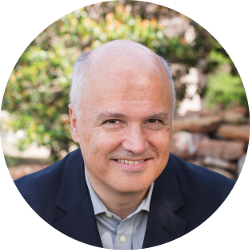In the beginning there was Star Trek. But a lot of stuff came before that.
I grew up reading science fiction. The first books I remember were the James Blish novelizations of Gene Roddenberry’s Star Trek TV series. The TV series was already in reruns by the time I became aware of it in the fifth grade. I was so much into the show that I would sit in front of the TV with my cassette recorder and tape the sound track of each episode.
(This was before you could stream the video from your phone. Before you could DVR it. Before you could buy the whole series on DVD. Before you could record it on your VCR. Back in the days of “stone knives and bearskins“, as Mr. Spock would have said.)
Next I borrowed “The Moon is a Harsh Mistress” by Robert A. Heinlein from my older brother, who had brought it home because he was supposed to write a book report on it. And after that “When Worlds Collide” by Philip Wylie and Edwin Balmer.
When I got to Junior High I read every science fiction book in the school library. Heinlein. Niven. Asimov. Then again in High School.
When I look back on the books I read in those years, I see a lot of diversity in the individual authors’ conceptions of the universe. While each one imagined that their stories took place in this universe, they each had their own unique view of what this universe was like—at least as far as the ‘fictional’ science.
What is generally consistent across those universes was a very “naturalistic” view of the universe. By that I mean the view that the universe (nature) is all there is. It is has always existed, and always will. It is, and it is all that is.
But modern science—virtually every field of modern science—contradicts that view.
Cosmology tells us that the universe began in a Big Bang. The universe had a beginning. It wasn’t and then it was. And that’s not just matter and energy. Space and Time did not exist prior to the instant when everything changed. This arises from Albert Einstein’s Theory of General Relativity, which has been corroborated by voluminous physical observations.
One of the fundamental principles of Science is that change requires a cause. Science has been defined as “the search for causes”. The universe cannot cause itself to begin to exist if it did not already exist. The cause must be outside the universe … outside of “nature” … super-natural. The Big Bang screams loudly that there is a God, as he is the most reasonable cause for the Big Bang.
But what about life?
When Charles Darwin wrote “The Origin of Species”, articulating his theory of evolution, the organic cell was considered the foundational element of life. With the primitive instruments available at that time, science understood the cell only as a gelatinous blob—a balloon filled with “protoplasm”. Our understanding of the fossil record was in its infancy.
Darwin made predictions about what the fossil record would eventually look like based on his theory, stipulating that if it didn’t turn out this way it would be a significant evidence against his theory. He said that the fossil record must show a gradual evolution of forms of life over many millions of years with many transitional forms.
In fact, the fossil record shows this is emphatically not the case. Virtually everything appeared “all at once”, at least in geological scale, in the “Cambrian Explosion”. Everything appeared fully formed, with no transitional forms observed.
And cells are not simple blobs of protoplasm. They are incredibly complex machines, each carrying a complete copy of your unique Operating System—otherwise known as DNA. DNA is nothing less than a coded program that tells the execution units inside your cells how to operate. DNA has an alphabet. It has a vocabulary. It has a grammar. It has specific meaning.
There are approximately three billion “symbols” in your DNA, and they’re not random. Just like a book, the letters are arranged in a complex pattern that specifies things. The DNA in a single cell of an amoeba is equivalent to 1000 complete sets of Encyclopedia Britannica.
That isn’t random chance. That’s intelligent design.
So here’s a question I’ve been puzzling over. If life here on Earth was created by God, and indeed the whole universe was created by that same God, if life exists elsewhere in the universe, what might that life look like?
